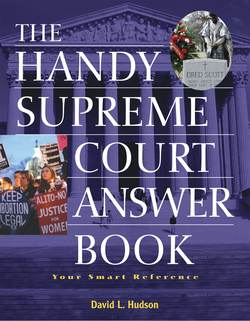Читать книгу The Handy Supreme Court Answer Book - David L Hudson - Страница 252
На сайте Литреса книга снята с продажи.
Who was Dred Scott?
ОглавлениеDred Scott was a slave owned by Peter Blow in Alabama. Scott moved with Blow when he moved to Missouri, another state that authorized slavery. After Blow died, his executor sold Scott to Dr. John Emerson, a St. Louis–based army doctor. Emerson then moved his family—and Scott—to Illinois, which was a free state. Emerson eventually moved back to St. Louis and died. Scott and his wife Harriet filed a lawsuit in Missouri courts, arguing that they were freed when Emerson had moved to the free state of Illinois. Emerson’s widow and her brother, John Sanford (court records misspelled his name as Sandford), contested Scott’s suit, leading to Scott v. Sandford case.
CourtSpeak: Scott v. Sandford Slavery Case (1857)
Chief Justice Roger Taney (majority): “In the opinion of the court, the legislation and histories of the times, and the language used in the Declaration of Independence, show, that neither the class of persons who had been imported as slaves, nor their descendants, whether they had become free or not, were then acknowledged as a part of the people, nor intended to be included in the general words used in that memorable instrument.”
Justice John McLean (dissenting): “By virtue of what law is it, that a master may take his slave into free territory, and exact from him the duties of a slave? The law of the Territory does not sanction it. No authority can be claimed under the Constitution of the United States, or any law of Congress.”
Justice Benjamin Curtis (dissenting): “To determine whether any free persons, descended from Africans held in slavery, were citizens of the United States under the Confederation, and consequently at the time of the adoption of the Constitution of the United States, it is only necessary to know whether any such persons were citizens of either of the States under the Confederation, at the time of the adoption of the Constitution. Of this there can be no doubt. At the time of the ratification of the Articles of Confederation, all free native-born inhabitants of the States of New Hampshire, Massachusetts, New York, New Jersey, and North Carolina, though descended from African slaves, were not only citizens of those States, but such of them as had the other necessary qualifications possessed the franchise of electors, on equal terms with other citizens.”
